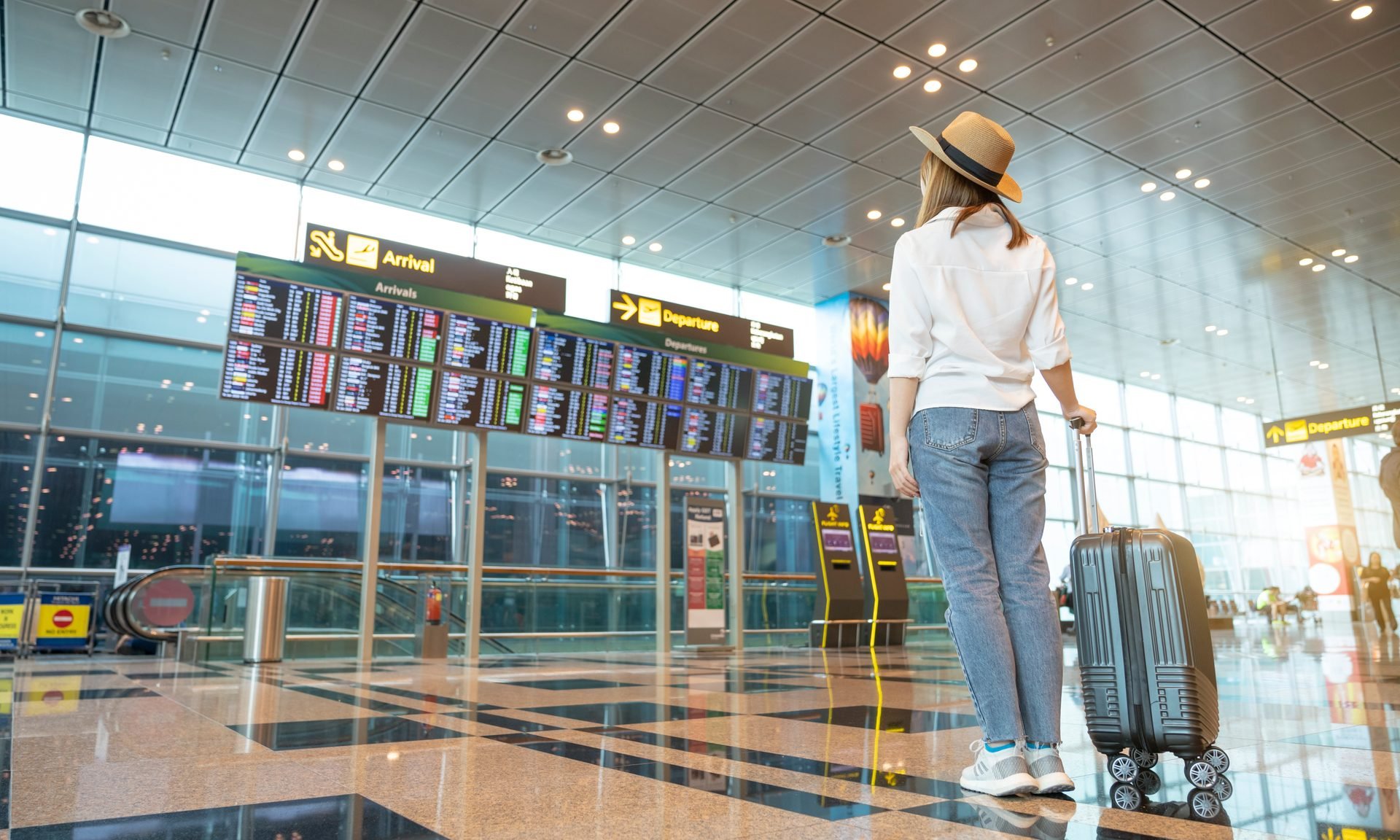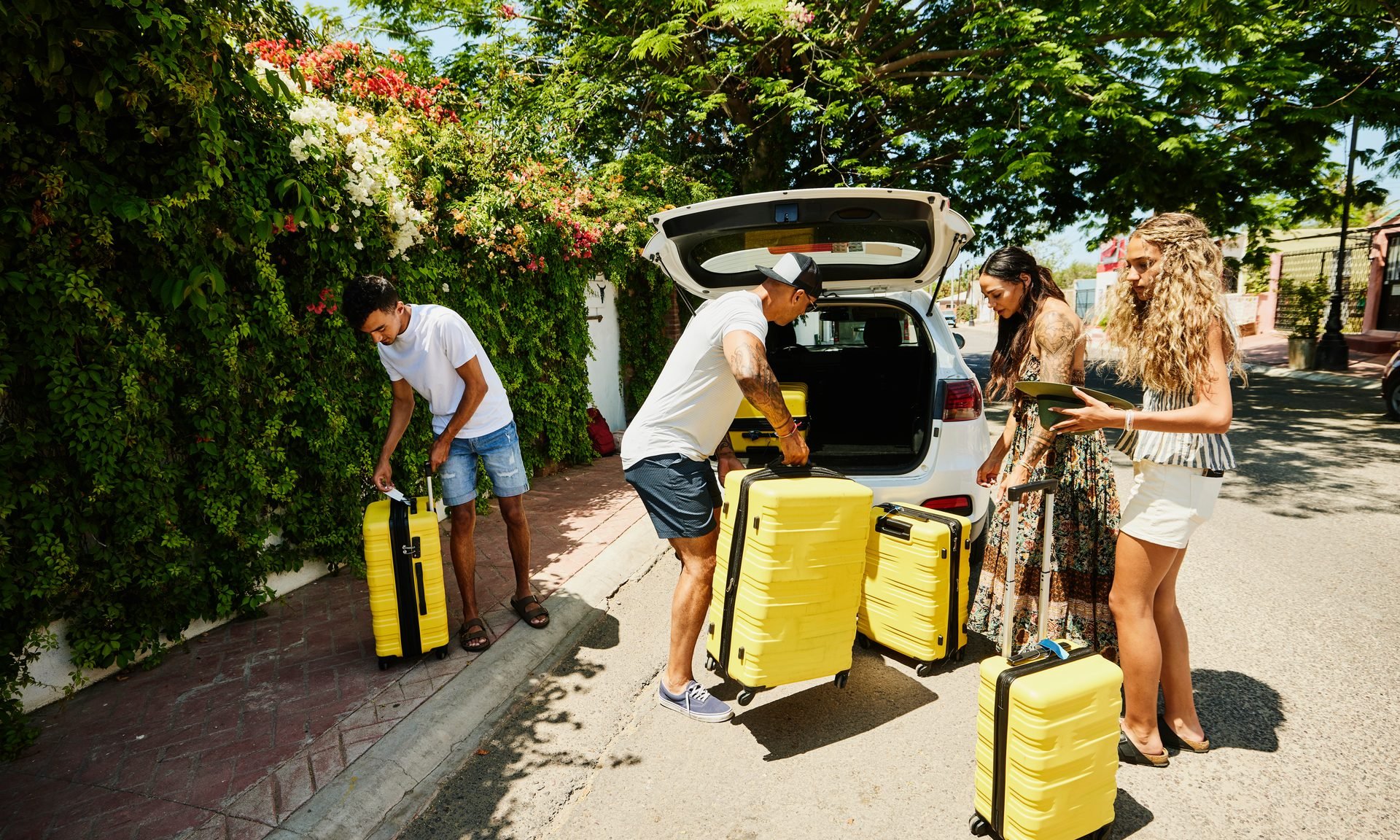Your Flight Was Canceled, Now What? Make These 8 Money Moves Now
Find out how to rebook your flight, obtain a refund or get other compensation for food and luggage.

Many or all of the products on this page are from partners who compensate us when you click to or take an action on their website, but this does not influence our evaluations or ratings. Our opinions are our own.
Thousands of travelers are stranded this week as flight cancellations ripple across major U.S. airports. Whether due to a government shutdown, or perhaps your trip was upended by severe weather, staffing shortages or aircraft maintenance issues, the financial fallout can sting as much as the disruption itself.
The good news: You have options. From understanding your right to a refund to securing alternative arrangements, take these steps to get your trip back on track for minimal cost, while also getting the flight cancellation compensation you deserve.
On this page
- 1. Get rebooked on the next best flight
- 2. Turn to your travel insurance
- 3. Look for other ways to get to your destination
- 4. Get fair compensation
- 5. Find your luggage
- 6. Make last-minute plans to pass the time
- 7. Wait it out in the airport
- 8. Get a refund
- Dealing with last-minute flight cancelations
1. Get rebooked on the next best flight
If your flight was among the thousands canceled this week, speed is everything. As soon as you receive notice — whether via text, app alert or gate announcement — immediately open your airline’s mobile app or website to check if you’ve already been automatically rebooked. Many major U.S. airlines now do this for passengers when large-scale cancellations occur.
If you haven’t been rebooked automatically, head to the customer service desk while simultaneously calling the airline’s hotline or reaching out via its app chat or social media accounts. Lines at airport counters can stretch for hours during mass disruptions, so it’s smart to work multiple channels at once.
What if the flight they rebooked me on doesn't work for my travel plans?
If there's another flight you'd rather take that's to the same or a nearby airport as your original destination, you can typically ask to be moved, again usually at no additional cost.
Some airlines also let you rebook on a partner airline (for example, Alaska Airlines and American Airlines are partners) at no additional cost. Though, that also assumes the partner airline is flying the route you need to take.
If you want to fly with a different airline, you'll likely be on your own in terms of cost. And booking last-minute airfare is typically expensive. While U.S. airlines are legally required to refund you for significant delays or cancellations, that might not be helpful if you snagged a $49 fare deal for a flight that has since been canceled, and you're now booking last-minute with a different airline for, say, $499. The $49 refund on a new $499 airfare might just feel like salt in the wound.
2. Turn to your travel insurance
In a month like November 2025 — when winter storms and airline staffing issues are triggering widespread disruptions — travel insurance can be your best safety net. If your policy includes trip interruption benefits, you may be reimbursed for additional costs like meals, lodging or alternative transportation.
Most major airlines will fund hotel accommodations when cancellations are within their control, but weather-related disruptions are trickier. Travel insurance can step in to reimburse you for expenses airlines won’t cover, including rental cars or rebooked flights on another carrier.
Just ensure that the reason you're invoking your policy is truly a covered reason, as not every insurer will protect you from every scenario. For example, severe weather is typically covered, though not always. A Cancel For Any Reason policy affords the most flexibility.
If you didn’t buy a standalone policy, check whether your travel credit card includes built-in trip delay or interruption coverage. Many do — and you may already be eligible just for paying for your flight with the card.
3. Look for other ways to get to your destination

A NerdWallet analysis found that last-minute car rentals can sometimes be 15% cheaper than advance bookings, and one-way rentals aren’t always more expensive. Some rental companies even discount them to reposition vehicles.
Look to other nearby airports, too. And, consider alternative modes of transportation such as trains.
4. Get fair compensation
The DOT's Airline Customer Service Dashboard outlines what each U.S. airline promises passengers during controllable cancellations or long delays, such as meal vouchers or hotel accommodations. While compensation isn’t legally required for weather-related issues, it never hurts to ask politely — especially at the customer service desk or via direct message on social media.
Even if your delay doesn’t meet an airline’s official threshold, gate agents sometimes issue bonus miles or meal vouchers as goodwill gestures.
Air travelers in Europe have even more rights. Under EU flight delay compensation rules, travelers are entitled to up to 600 euros for delays and cancellations, depending on the trip distance and length of the delay.
If you're not at the airport when you hear about your delay or cancellation, contact your airline's customer service via phone, mobile app or social media accounts.
5. Find your luggage

Lost or delayed luggage adds another layer of frustration to already chaotic travel days. Ask the airline’s baggage team where your checked bags are — they might still be on the plane, in transit or already at the carousel.
To stay in control, track your own bags using Bluetooth devices like Samsung Galaxy SmartTags or Apple AirTags, which can communicate with a paired smartphone or tablet via Bluetooth to share locations. Since these products don't use a SIM or their own data connection, there is also no monthly fee to use these devices beyond the initial cost to buy them (and they typically cost less than $50).
While you should never pack essentials like medication in checked baggage (keep that in your carry-on), the customer service counter can usually help you retrieve your bags should you need to access your stuff in the interim.
Most travel insurance policies include some form of lost luggage reimbursement, so you can get money back for items you packed and lost, should your bags end up gone for good amid the chaos of a canceled flight.
6. Make last-minute plans to pass the time
If you’re grounded overnight or facing a long delay, make the most of it. Turn the disruption into an opportunity to explore or relax — and maybe even save money doing it. If you’re stuck in a new city unexpectedly, check out local events or same-day tickets through sites like TodayTix, which can make an impromptu night out more affordable.
Find last-minute hotels
If you’re facing an overnight delay, a good airport hotel can make all the difference. Look for properties that can fit multiple travelers and include free meals to minimize added costs.
SpringHill Suites rooms can sleep up to six guests, making them a smart choice for families trying to stay together without paying for multiple rooms. Other wallet-friendly brands — including Fairfield Inn, Residence Inn, SpringHill Suites and TownePlace Suites — offer complimentary breakfast, helping travelers save on food costs when flights are delayed or rescheduled.
If your airline isn’t covering accommodations, use last-minute deal apps like HotelTonight or check your credit card travel portal for same-day discounts. NerdWallet analysis has found that booking hotels last-minute can often be cheaper than reserving weeks in advance — and some higher-end hotels even drop prices close to check-in.
7. Wait it out in the airport

If your delay is just a few hours, airport lounges can make the wait far more comfortable. You may not necessarily need to hold elite status or fly in first class to get lounge access. Many travel credit cards offer lounge access as a benefit for holding the card.
Even without lounge access, there's hope as U.S. airport terminals are getting better. Increasingly, U.S. airports are upgrading amenities with quiet seating areas, yoga studios, children’s play zones and even live music.
Others simply offer stunning views. Take Wyoming's Jackson Hole Airport, which is considered one of America's most charming airports; it takes full advantage with soaring windows that frame the mountain range.
You might also post up in an airport lounge. Lounges can offer relative quiet, comfortable seating and complimentary refreshments. To access the lounge, you often need to hold elite status with an airline or be flying on a business or first class fare.
8. Get a refund
If your flight was canceled and you choose not to travel, you’re entitled to a full refund under Department of Transportation rules. That includes the fare and any additional fees, such as checked bag or seat selection costs.
Refunds are typically processed automatically, but if not, use your airline’s online refund form or contact customer service. Be wary of accepting travel vouchers instead — cash refunds give you flexibility, while vouchers often expire within a year.
Remember that you don’t have to accept a new flight if it doesn’t meet your needs. You always have the right to a refund if the airline cancels or significantly changes your flight.
Dealing with last-minute flight cancelations
Having your flight canceled is never fun — and during a nationwide disruption like November 2025’s, patience is essential. Know that you’re entitled to a cash refund if you choose not to travel, and don’t hesitate to ask for compensation like meal or hotel vouchers.
While refunds can’t replace a missed event or lost vacation day, having travel insurance and a backup plan — whether that’s a flexible credit card or a go-to airport hotel brand — can turn a travel nightmare into a manageable detour.
Article sources
NerdWallet writers are subject matter authorities who use primary,
trustworthy sources to inform their work, including peer-reviewed
studies, government websites, academic research and interviews with
industry experts. All content is fact-checked for accuracy, timeliness
and relevance. You can learn more about NerdWallet's high
standards for journalism by reading our
editorial guidelines.
On this page
- 1. Get rebooked on the next best flight
- 2. Turn to your travel insurance
- 3. Look for other ways to get to your destination
- 4. Get fair compensation
- 5. Find your luggage
- 6. Make last-minute plans to pass the time
- 7. Wait it out in the airport
- 8. Get a refund
- Dealing with last-minute flight cancelations
Limited Time Only: Earn $1,000 Toward Travel!
Capital One Venture Rewards Credit Card 
Travel

For a limited time, the
Capital One Venture Rewards Credit Card is offering new cardholders an especially rich bonus: Enjoy $250 to use on Capital One Travel in your first cardholder year, plus earn 75,000 bonus miles once you spend $4,000 on purchases within the first 3 months from account opening - that’s equal to $1,000 in travel!
More like this
Related articles









